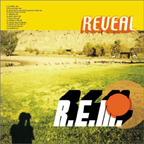|
It's always seemed strange to argue that R.E.M. is one of the all-time great rock and roll bands, though they've established enough career longevity to qualify. They don't really rock, in the pure parent-frightening sense of the term, nor are they in any way funky - all of the qualities that megabands (and direct descendants of black rhythm n' blues) such as AC/DC, the Stones and Zeppelin championed, R.E.M. has always shunned. They have never craved attention either; R.E.M.'s legacy is much more in tune with cult artists like Richard Thompson, Patti Smith and the bevy of great DIY underground bands that the guys from Athens, GA shared the college-radio airwaves with during the early eighties. So, all of the record-biz apprehension regarding the "disappointing" sales figures of R.E.M.'s more recent albums really has no bearing on whether these guys are still relevant; even more so than U2, R.E.M. has moved above the fray. Reveal is similar to 1998's Up, but there's a mellower, more pleasant vibe this time around. Two songs seem destined for lots of radio airplay, although MTV of course has long since moved on to younger, fleshier pursuits: "All the Way to Reno (You're Gonna Be A Star)," and "Imitation of Life," which features cool words and a great string section as well as Peter Buck's trademark Rickenbacker jangle. Many of the remaining songs are driven by Mike Mills' keyboards (his bass and backing-vocal talents are downplayed, unfortunately). Reveal also marks only the second time R.E.M. has printed Michael Stipe's lyrics in the liner notes (after Up), but it's still more fun to make up your own most of the time. Reveal may not linger on the charts for eons, but that's just as well. Forget the box-office mentality that has so pervaded the culture: these unlikely paragons are pursuing something more permanent. -Patrick Reed
 Billie Holiday Billie HolidayDefinitive Billie Holiday (from Ken Burns' "Jazz") Verve Records Every once in a while (even longer in terms of modern music), there comes along a singer whose voice has an undeniable beauty and musicality. Such is the case with Billie Holiday. Even non-jazzheads appreciate the emotional range of the deceased jazz legend: sometimes happy, sometimes sad, sometimes lofty and political, sometimes drenched in earthy blues. Holiday's voice allows modern audiences to connect with the feeling of jazz clubs popular in the 1930s and 1940s; the hushed clangs and thumps of dulled snare drums and softly-stroked cymbals, hazy plumes of blue cigarette smoke, the smell of cheap wine and whiskey floating through the speakers, all materializing and fading at Holiday's command. While Burns' Definitive collection (drawn from his epic PBS-documentary Jazz) appears to be a "best hits" compilation, its aim is different. The Definitive Billie Holiday attempts to capture the life of jazz music's leading lady through her music. The listener bears witness to the changes in Holiday's vocal style as she grows older - her angelic voice nearly destroyed by years of abusing drugs and alcohol. Yet, even at her worst, Holiday's music is superb. She has the ability to drift out of the background instrumentation, and, in the foreground, captivate her audience. Songs like "I Cried For You" and "Good Morning, Heartache" share stories of love lost or unrequited while "Strange Fruit" stands firm as an anti-lynching protest ballad. In the end, The Definitive Billie Holiday is not only a great jazz album, but a history of jazz music as well. Many thanks to Ken Burns for reminding us what music, and perhaps a little moonlight, can do.-Eric Newman
The world is a better place with a new Weezer album. Modern alternative radio has settled into the blandness of bands like Matchbox Twenty and Vertical Horizon and knockoffs such as Creed and Lenny Kravitz . Whatever happened to The Breeders, or Fountains of Wayne or the Presidents of the United States of America? With the release of The Green Album, Weezer catapults itself out of the "Whatever Happened To.?" Club and back onto the radio. In the long five years since the emotionally revealing, (but poor selling) Pinkerton, Weezer has wandered. Leadsinger/Songwriter Rivers Cuomo went to college, bassist Matt Sharp went to the Rentals, and it appeared as if Weezer was destined to be just another casualty of modern music. But after regrouping, sans Sharp, and embarking on a sold-out mini tour, they went back into the studio, picked out a new color and out came The Green Album. Reuniting with producer Ric Ocasek, former frontman for the Cars, T.G.A. is a very tight 28 minutes of the punk power pop that made Weezer famous in the first place, chock full of catchy hooks, sing-a-long choruses and loud chunky guitars. "Hashpipe," the first single, which oddly enough resembles the theme to Peter Gunn, is sure to be the only song on z103 about a transvestite. "Island in the Sun" is escapist fun, a much softer sounding song for a band that played on the Warped Tour. The final track, "O Girlfriend," is the one that best reflects some of the openness and depth heard on Pinkerton, a theme they will surely revisit in future releases. Hopefully, the success of Green will not mean another five year wait for the next Weezer record. After all, according to the Crayola Box of 64, there are 61 colors left for them to use as album names. -Kevin Faris
|
||
|
|
 R.E.M.
R.E.M.  Weezer
Weezer